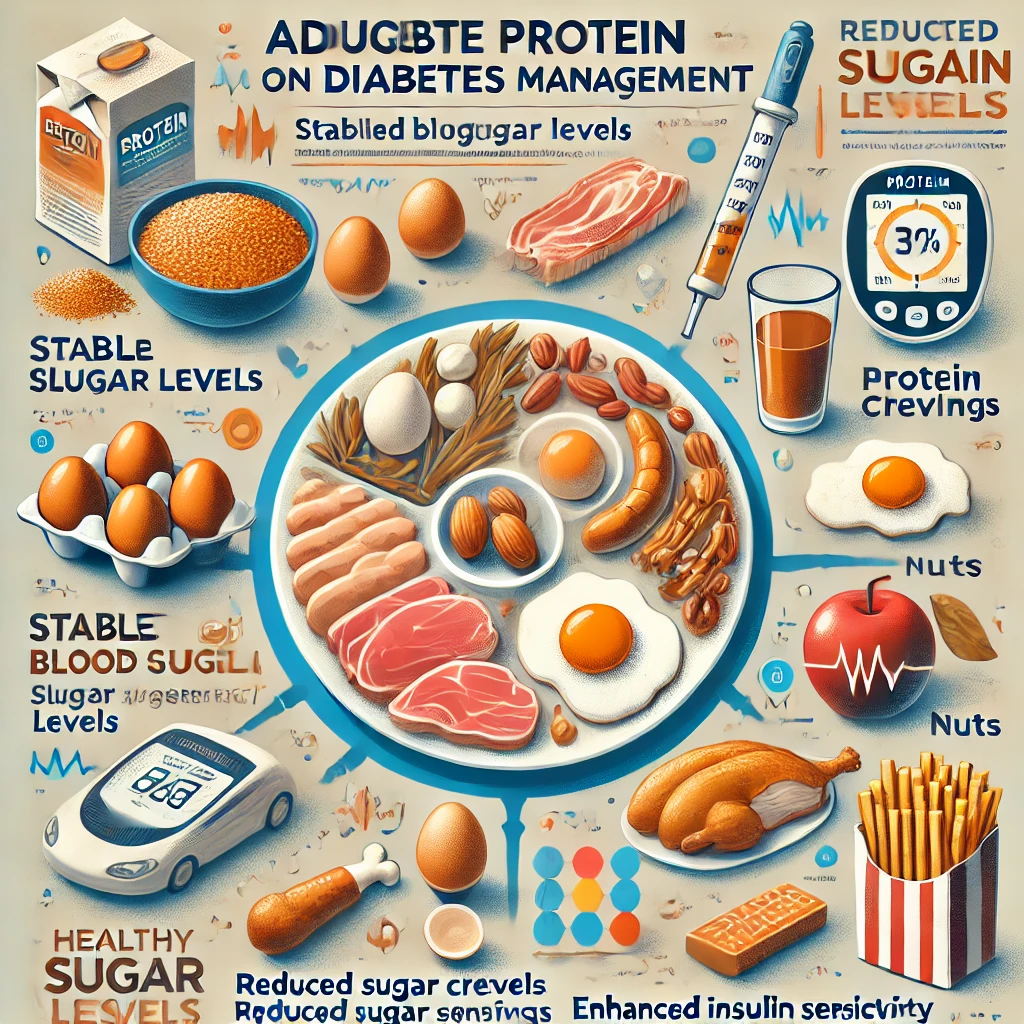Research suggests that consuming adequate protein can play a significant role in managing diabetes by regulating blood sugar levels, reducing sugar cravings, and enhancing insulin sensitivity. Here’s a summary of key findings:
1. Protein and Blood Sugar Regulation
Protein has a minimal impact on blood glucose levels compared to carbohydrates. Studies show that replacing some carbohydrate intake with protein can help stabilize blood sugar levels in individuals with diabetes.
- Study Highlight:
- A study published in the American Journal of Clinical Nutrition (2015) demonstrated that a high-protein diet improved glycemic control in people with Type 2 diabetes by reducing post-meal blood sugar spikes.
- Mechanism: Protein slows down gastric emptying and carbohydrate digestion, resulting in more stable blood sugar levels.
2. Protein Reduces Sugar Cravings
Consuming adequate protein helps maintain satiety, reducing the likelihood of consuming sugary snacks. Protein influences hunger-regulating hormones like ghrelin and GLP-1, which signal fullness.
- Study Highlight:
- A study in Obesity (2014) found that high-protein breakfasts reduced cravings for sugary foods throughout the day in overweight individuals.
- Practical Insight: Including protein-rich foods like eggs, Greek yogurt, or lean meats can curb sugar cravings, making it easier for diabetics to adhere to a low-sugar diet.
3. Protein and Insulin Sensitivity
Adequate protein intake supports muscle mass, which plays a critical role in improving insulin sensitivity. Muscle tissue is a primary site for glucose uptake, and higher muscle mass correlates with better glucose metabolism.
- Study Highlight:
- A study published in Diabetologia (2016) observed that higher protein diets, combined with resistance training, improved insulin sensitivity in individuals with prediabetes.
- Mechanism: Muscle mass increases the body’s ability to utilize glucose effectively, reducing the need for insulin.
4. Protein as a Substitute for Sugar
Protein-rich diets help diabetics reduce their reliance on quick-energy sources like sugar by providing sustained energy.
- Study Highlight:
- Research in Nutrients (2020) suggested that replacing sugary snacks with high-protein alternatives reduced glycemic variability and improved overall energy balance in diabetics.
- Recommendation: Snacks like nuts, cheese, or boiled eggs can replace sugary options, providing steady energy without spiking blood sugar.
5. Protein and Hormonal Regulation
Protein influences glucagon, a hormone that works alongside insulin to regulate blood sugar. High-protein diets stimulate glucagon secretion, helping stabilize blood glucose levels.
- Study Highlight:
- A study in The Journal of Endocrinology (2018) found that meals high in protein increased glucagon levels, reducing post-meal blood sugar fluctuations.
- Practical Insight: Incorporating protein into every meal can help maintain balanced blood sugar levels.
Conclusion
Studies indicate that adequate protein intake can significantly benefit individuals with diabetes by stabilizing blood sugar, reducing cravings for sugar, and enhancing insulin sensitivity. Incorporating protein into a well-balanced diet can lower the need for added sugars, improving overall diabetes management. However, it’s essential to consult with a healthcare provider or dietitian to tailor protein intake to individual needs and health conditions.










